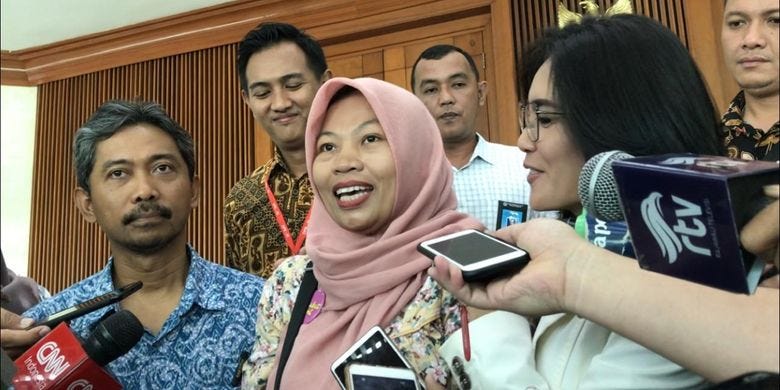A reconciliatory MRT ride | Cashless catching on big time | Indonesia Intelligencer (July 13-19)

Welcome to this free edition of Indonesia Intelligencer, a concise weekly digest of the most important news and thought-provoking features from the archipelago. We occasionally send out free editions of I.I. like this to show potential readers what this newsletter is all about, but only paid subscribers will receive every week’s newsletter and have full access to our archive.
You can click here to get a free one-month trial subscription to Indonesia Intelligencer so you can start getting the most essential political, business, and cultural news of the week delivered to your inbox every Friday. Thanks for reading and have a great weekend!
Business

Cashless catching on big time
Bank Indonesia (BI) has recorded a 262.6% year-on-year increase in electronic payments in Indonesia in May 2019, while online transactions through digital banking rose by 34.5% over the same period.
The central bank says the figures highlight a growing preference by Indonesians for digital money services.
Interest rate finally cut
BI cut its benchmark interest rate for the first time in nearly two years on Thursday. The central bank’s seven-day reverse repo rate now stands at 5.75%, down 25 basis points from 6%.
The cut was done in anticipation of a similar move by the US Federal Reserve at its July policy meeting. BI says it sees scope for more cuts to boost economic growth in the near future off the back of a healthier rupiah and political stability post-election.
Trade surplus the norm in 2019
Indonesia booked a US$200 million trade surplus in June, the fourth recorded monthly surplus this year after February, March, and May.
In June, month-to-month exports dropped 20.54% to US$11.78 billion, while imports were also down 20.7%.
E-commerce import regulation
The government says it’s preparing a cross-border trade regulation to prevent the domestic market from being inundated with imported goods from e-commerce platforms.
Details about the planned regulation have not been revealed, but the government says it won’t be too strict considering cross-border e-commerce trade still makes up a small portion of imports into the country, though it’s growing fast.
Go-Jek making major moves
Astra, Indonesia’s largest automobile distributor, has teamed up with Go-Jek to provide the ride-hailing firm with cars that its partner drivers can rent. The program, called Go-Fleet, is aimed at those who seek to drive for Go-Jek but do not own a car.
Global payments technology company Visa this week announced it has invested in Go-Jek — amount not disclosed — in the ride-hailing firm’s latest fundraising round. The two companies are expected to work together to provide more digital payment options for customers in Indonesia and throughout Southeast Asia.
EV 2022: Indonesia is aiming to start producing electric vehicles (EVs) in 2022 after a number of companies, including Toyota and Hyundai, expressed interest in building EV plants in Indonesia (see previous weeks’ newsletters).
Recommended reads
How Indonesia finds itself in the middle of a US-China trade war (The Interpreter)
There has been a weakening in international trade, a fall in business confidence, and sluggish investment in developing economies, all of which has led to a revised prediction of global economic growth. Indonesia, like many countries, is caught between.
Getting creative in Indonesia (The Asean Post)
The creative industry has the potential to generate valuable, dignified jobs in an era of rapid industrial automation. But unlocking the full potential of the creative economy will be a challenge for Indonesia.
Politics

Prabowo and Jokowi’s MRT meeting
President Joko Widodo and his defeated electoral rival, Gerindra chairman Prabowo Subianto, met on Saturday for the first time since the divisive April 17 election. The photo-op friendly meeting included the two political leaders taking a ride together on Jakarta’s recently-inaugurated mass rapid transit (MRT) system.
Prabowo said he was “ready to help the president” after their meeting but did not comment on the much-speculated upon possibility that Gerindra may join the government coalition.
Prabowo is said to be meeting with senior Gerindra officials today to determine whether they will join the government or remain the leader of the opposition.
The meeting between the two leaders did mark the end of the alliance between the Islamist political organization PA 212 and Prabowo, with the hardliner group calling Prabowo a “traitor.”
Jokowi’s vision for his second-term
On Sunday, President Jokowi gave a speech outlining his vision for a second term, pledging faster infrastructure development and more investment opportunities to create jobs and grow the economy.
Among the points outlined in his speech, the president said he would focus on connecting ports and airports across the country to agricultural and tourism centers, improving human resources through investments in vocational schools, and increasing investment opportunities by removing barriers and bureaucracy.
Big plans with the Little Red Dot
President Jokowi met with Singaporean Foreign Affairs Minister Vivian Balakhrisnan on Wednesday in Bogor to discuss ways that their two neighboring countries could enhance bilateral cooperation on infrastructure, investment, and the development of human resources.
Dr Balakhrisnan emphasized that Indonesia and Singapore would work closely together to attract investments and become an integral part of the global supply chain.
Recommended reads
After Jokowi’s Indonesia Election Win, What’s Next for Prabowo’s Supporters? (The Diplomat)
Courting (FPI leader Rizieq) Shihab had been a priority for the Subianto-Uno campaign team, with Subianto visiting the cleric in Saudi Arabia and vowing to allow him to return to Indonesia without fear of prosecution on outstanding pornography charges. Now, Gerindra Party members are suggesting that bringing Shihab home is part of negotiations in joining the governing coalition.
It’s hard to imagine why Jokowi would go for it. The post-election dust has settled, and with a monstrous command of the parliament, thanks to a strong showing of his Indonesian Democratic Party of Struggle and other factional allies, the benefit of welcoming Subianto beyond a show of “unity” does not have a solid case. It certainly does not justify risking his own relatively harmonious presidency to have Shihab return home and, presumably, recommence his campaign to be a thorn in the side of moderate Indonesian politics.
From stagnation to regression? Indonesian democracy after twenty years (New Mandala)
Indonesia is a rare case of democratic transition and persistence in Southeast Asia. But like many other countries around the world, Indonesia’s democracy increasingly shows signs of fragility and even regression. In recent years there has been a rise in authoritarian populism, arbitrary state crackdowns on freedom of speech and organisation, and a deterioration in the protection of minority rights. There are more deep-seated problems too: corruption, clientelism, unequal access to legal protection and redress, under-representation of lower-class and minority voices, and growing support for religious majoritarianism amongst the political class. Many symptoms of democratic fragility were first diagnosed during the second term of President Yudhoyono (2009-2014); but to the surprise of many observers, the most dramatic decline in democratic quality has occurred on President Jokowi’s watch (2014-).
Other News and Notable Features

Two quakes hit Eastern Indonesia
On Sunday, a magnitude 7.3 quake — centered 166 kilometers southeast of Ternate, the capital of North Maluku province — damaged dozens of buildings and killed at least two people.
That was followed by a magnitude 5.8 earthquake that struck the southwest of Bali on Tuesday morning. Seven people reportedly sustained minor injuries and more than 44 buildings were damaged on the island.
Amnesty for Baiq Nuril almost achieved
Baiq Nuril — the woman who was sentenced to six months in prison for recording her boss’ sexual harassment on tape — was granted amnesty by President Jokowi this week after the Supreme Court rejected her appeal and refused a judicial review.
However, the House of Representatives (DPR) must still sign off on the president’s amnesty before it can take legal effect. The DPR is set to discuss the amnesty deal next week.
Judgement day for Bali bombing funder
Legal teams are reportedly preparing for the long-awaited trial of Indonesian terrorist leader Riduan Isanuddin, who has been incarcerated at Guantanamo Bay for 13 years.
Isanuddin was captured in Thailand in August 2003, 10 months after the devastating Bali bombing which he stands accused of funding.
Garbage power
President Joko Widodo released a statement this week urging cities across the country to set up waste-to-energy plants this year to tackle the country’s growing trash problem.
Cities including Jakarta, Surabaya, Bekasi and Solo had already pledged to build such plants, which incinerate trash to drive turbines to create power.
Investigation into attack on KPK investigator turns up empty handed
A six-month long investigation into an acid attack that left a prominent Indonesian corruption investigator Novel Baswedan partially blind failed to identify the perpetrators, authorities announced this week.
Investigators believe the attack was linked to one of six high-profile corruption cases Baswedan was probing at the time — including a government project to issue new electronic ID cards that allegedly saw about US$170 million defrauded from the government.
Rights activists warn that the government’s inability to catch the perpetrators will set a bad precedent that will lead to more aggressive acts of violence and intimidation against corruption investigators.
Recommended reads
Baiq Nuril, the ITE Law and #MeToo Indonesian style (Indonesia at Melbourne)
It is not just Nuril who loses from this case. In addition to the stigma that many victims of sexual harassment in Indonesia already face, the decision of the Supreme Court is likely to dissuade other women from seeking redress.
It is little wonder that the #MeToo movement is taking a while to take off in Indonesia.
Among Oil Palm, Rain Forest and Orangutans, Shades of Gray (New York Times)
It was easy to be moved by Hope’s tragic trajectory, but I also wanted to know more about the villagers who had come into conflict with orangutans. Tales that initially seem like simple parables of good and evil are often more complicated when one delves deeper. Instinct told me that the shades of gray would be what made this story.
What Indonesian women fear about law granting men more wives (South China Morning Post)
Acehnese women fear the law would lead to polygamy becoming a “tradition” and part of the lifestyle in their society, affecting on their rights and their children’s.
Female activists also warned if the draft bill was passed, it could trigger similar calls in other provinces throughout Indonesia.
Top Coconuts News

Defamation report against travel reviewer dropped by Garuda Indonesia employee union
Former house speaker Setya Novanto moved from supermax prison over comfort concerns
FBI seeking victims of Indonesia showbiz scam masterminded by the ‘Con Queen of Hollywood’
Indonesian woman says she attacked husband with ax because he kept forcing her to have sex


